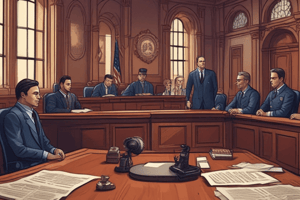Podcast
Questions and Answers
Which section of the Criminal Code outlines the powers of a peace officer to arrest without a warrant?
Which section of the Criminal Code outlines the powers of a peace officer to arrest without a warrant?
- Section 507(6)
- Section 495(1)(b)
- Section 495(1)(a)
- Section 495(1)(c) (correct)
What are the three main types of arrest warrants mentioned in the text?
What are the three main types of arrest warrants mentioned in the text?
- Warrant in the First instance, Bench Warrant, Material Witness Warrant
- Warrant in the First instance, Bench Warrant, Appearance Notice
- Warrant in the First instance, Committal Warrant, Material Witness Warrant
- Warrant in the First instance, Bench Warrant, Committal Warrant (correct)
When a peace officer has an arrest warrant that is endorsed by a Justice under s. 507(6) of the Criminal Code, what discretion do they have?
When a peace officer has an arrest warrant that is endorsed by a Justice under s. 507(6) of the Criminal Code, what discretion do they have?
- They have no discretion and must arrest the person.
- They may release the person on an appearance notice or undertaking. (correct)
- They must obtain a Committal Warrant before releasing the person.
- They must release the person on an appearance notice or undertaking.
Which type of offence can a peace officer arrest a person for without a warrant, according to the text?
Which type of offence can a peace officer arrest a person for without a warrant, according to the text?
What are the three key requirements for a peace officer to arrest a person without warrant under Section 495(1)(a) of the Criminal Code?
What are the three key requirements for a peace officer to arrest a person without warrant under Section 495(1)(a) of the Criminal Code?
What is the key difference between the arrest powers outlined in Sections 495(1)(a) and 495(1)(b) of the Criminal Code?
What is the key difference between the arrest powers outlined in Sections 495(1)(a) and 495(1)(b) of the Criminal Code?
What is required for an officer to make an arrest without a warrant?
What is required for an officer to make an arrest without a warrant?
If a citizen arrests someone based solely on a hunch, is this lawful?
If a citizen arrests someone based solely on a hunch, is this lawful?
What is the first step an officer should take when making an arrest?
What is the first step an officer should take when making an arrest?
If an officer witnesses someone committing mischief by damaging a car, what is their authority to arrest?
If an officer witnesses someone committing mischief by damaging a car, what is their authority to arrest?
If a credible witness points out someone riding a stolen bicycle, what is the officer's authority regarding arrest?
If a credible witness points out someone riding a stolen bicycle, what is the officer's authority regarding arrest?
What must an officer do after arresting an accused?
What must an officer do after arresting an accused?
According to section 494(1)(a) of the Criminal Code, which of the following statements is true?
According to section 494(1)(a) of the Criminal Code, which of the following statements is true?
According to section 494(1)(b) of the Criminal Code, which of the following conditions must be met for someone to arrest without a warrant?
According to section 494(1)(b) of the Criminal Code, which of the following conditions must be met for someone to arrest without a warrant?
According to section 494(2)(a)(b) of the Criminal Code, which of the following statements is true regarding the authority of an owner or person in lawful possession of property?
According to section 494(2)(a)(b) of the Criminal Code, which of the following statements is true regarding the authority of an owner or person in lawful possession of property?
What does the acronym 'RCA' stand for in the context of a peace officer's duties?
What does the acronym 'RCA' stand for in the context of a peace officer's duties?
What does the acronym 'R/G' stand for in the context of a peace officer's duties?
What does the acronym 'R/G' stand for in the context of a peace officer's duties?
What is the purpose of the 'RCA' process for peace officers?
What is the purpose of the 'RCA' process for peace officers?




